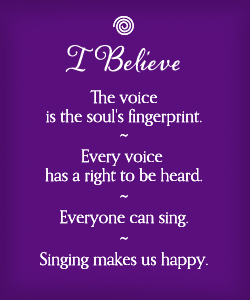 I have not written recently because I have been working on a book about life lessons and voice. Here is an excerpt about the Four Layers of the Voice, a concept I have been exploring for some years. I would love your feedback on these ideas. What do you think? Do they trigger any personal experiences with your own voice? Do they ring true? Thanks for your reflections.
I have not written recently because I have been working on a book about life lessons and voice. Here is an excerpt about the Four Layers of the Voice, a concept I have been exploring for some years. I would love your feedback on these ideas. What do you think? Do they trigger any personal experiences with your own voice? Do they ring true? Thanks for your reflections.
______________________________________________________________
We use the word ‘voice’ to reflect a multitude of situations – from speaking to singing to expressing ourselves to the voice of an artist or a group to the sound of an instrument, the melodic voice of a symphony or a whale. Voice can be aloud or silent, the voice of a singer or a painter, friends talking or speaking in sign language. We give voice to our feelings and opinions. We speak with one voice or many. We are in good voice or not. We lose our voice – physically or psychologically. We listen to the voice of birds or the sea. We listen to our inner voice and the voice of Spirit.
In my voice lessons, workshops, rehearsals and performances, voice encompasses all these experiences, expressed in words – silent, spoken, written or sung, in work, in creative endeavors, alone or with others, and in creating a life, giving voice to who we are. Over thirty years of teaching, I have sung with toddlers, children, teens, adults and seniors – from ages two to ninety-two. What everyone has in common is the deep urge to connect with others through voice, to give voice to our thoughts, needs, feelings, cares and desires, to share and listen.
Some years ago, I was invited to teach a Vibrant Voice workshop for a women’s chorus in Rhode Island. The Director was a good friend of mine. She wanted her women to experience their voice outside of the confines of choral music. Singers and voice students can get stuck in the limiting expectations of having a “good voice,” of singing carefully to meet the directions of their teacher or conductor, and of separating their musical voice from the voice of their life.
In the introduction to my workshop, I explained that we were going to explore the four layers of the voice – the Public voice, the Private voice, the Inner voice and the Core voice. The concept of the Four Layers of the Voice gave them permission to try some new things, to use their voice in ways they had never tried before. Most singers strive for a beautiful Public voice, separating themselves from the deeper levels. By digging into all four layers of the voice, we can enhance the expressive beauty of the Public voice. As I told the participants, opening one layer, opens them all. Exploring a deeper level of the voice helps them sing in a free-er, more embodied way.
Briefly, the Public voice is the voice we use in public. It is polite, socially acceptable and carefully modulated. It follows the rules. It is essential to daily interactions. It is the painting, the performance, the book.
The Private voice is the voice we use in private, at home, speaking with our family or trusted friends. Because our family relationships create a measure of safety, we feel more comfortable saying what we really think, feel or need. This layer can be more honest, but it makes an effort to speak “appropriately.”
The Inner voice is the voice in our head, our interior monologue. It is the voice that narrates our experience – observing, commenting, judging, and planning. It is what we really think about someone or a situation, which we deem imprudent to say out loud. This layer is the most complex because it includes our own thoughts, feelings and judgments as well as the thoughts, feelings and judgments that we have adopted from others -like our parents, siblings, teachers, friends, ministers, therapists, etc. It can be confusing to sort out which voice is ours and which is actually the voice of another, which we unconsciously absorbed as truth. This is especially true of the voices and beliefs of our parents. When we are newly born, their voice is our first means of organizing this strange new world.
The Core voice is the voice of the soul. It is the vibration of truth. It is the voice that knows what we want, what’s truly good or bad for us. It prods our choices. These truths can be inconvenient and create conflict with our public, private and inner voices. The upper three levels can be very noisy and compelling, distracting us from the quiet urgings of the Core voice. The Four Layers of the Voice are intertwined. As we experience the depth of each level, we expand the resonance of our voice across the spectrum. We begin to fully inhabit and embody our voice.
Let me know what you think. Keep on singing!

Speak Your Mind